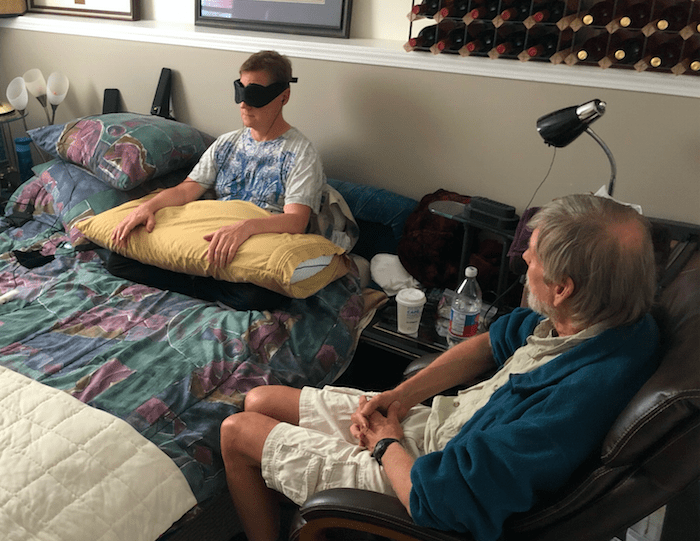Denying access to psilocybin for palliative care patients seems arbitrary and cruel, advocates say.
Spencer Hawkswell, CEO of Victoria-based non-profit TheraPsil, says that a number of patients who applied for access under Section 56 of the Controlled Drugs and Substances Act have recently been denied.
They were told by Health Canada to access the substance through the newly updated Special Access Program (SAP) or clinical trials.
“This is a bit distressing for those patients because they’ve already spent months getting their necessary forms and documents ready for their Section 56 exemption,” Hawkswell tells Mugglehead by phone.
While some patients get approved, others with the same conditions are getting denied. Hawkswell calls the agency’s conduct “incredibly short-sighted” and says it “completely lacks compassion.”
Before changes made to the SAP — which allow legal access to restricted substances for patients with dire need — came into effect in January, the previous route for such access was under Section 56 exemptions. That section facilitated access to alternative therapies when traditional options failed.
Read more: What amendments to Canada’s restricted drug program mean for patients and practitioners
Read more: Health Canada says patients should access medical psilocybin via clinical trials
Thread 🧵
BREAKING: Health Canada has just notified TheraPsil and dozens of health care professionals seeking psilocybin access and training that their section 56 exemptions are to be denied. (1/ )
— TheraPsil (@TheraPsil) February 2, 2022
Some patients get approved while others with other life-threatening conditions don’t
One patient whose application was recently denied has found psilocybin helps treat her cluster headaches. These are sometimes referred to as “suicide headaches,” as the extreme pain and lack of known treatment has led some people to take their own life.
Another patient who was denied access suffers from a heroin-use disorder, and finds small doses of psilocybin help him steer away from opioids and feel hopeful.
On the other hand, a patient suffering from treatment-resistant depression had their exemption granted on Tuesday.
“And you know, that happened four days after seven palliative patients were told that they don’t get it,” Hawkswell explains.
While federal Health Minister Jean-Yves Duclos has shown support for medical psilocybin, Hawkswell says decisions on who’s granted access are made randomly by Health Canada staff and by not trained medical professionals.
“So it’s a very flawed system.”
Today 2 more patients supported by @TheraPsil received section 56 exemptions to use Psilocybin.
At the same time, 7 other palliative Canadians are being denied access and told to go through SAP or Clinical trials. @jyduclos Canadians need your help.
— SpencerHawkswell (@SpencerHawkswe1) January 31, 2022
Denying psilocybin access to healthcare practitioners is ‘alarming’
On Wednesday, Health Canada denied around 130 healthcare professionals seeking access to psilocybin for training purposes and to help patients needing treatment.
According to Hawkswell, that’s almost a bigger crisis, as patients need practitioners to guide them through therapy.
“That means that the 1,000 or more healthcare practitioners in our waiting list are not going to be able to get their experiential training, and it also means that the 1,500 patients that have messaged us looking for trained healthcare practitioners to support their exemptions and their therapy are in the same place they were three years ago.”
Read more: Canada’s first set of approved health workers begin psilocybin therapy training
Currently, there are currently 19 doctors and therapists legally authorized to use psilocybin.
Today literally is my #GroundhogDay. For 1295 Days, I have woken up with #statusmigrainosus. It waxes & wanes, but I have a #migraine all day, everyday. Please make #psylocibin available to all who need!
— Shannon McKenney (@ShannonMcKenney) February 2, 2022
SAP amendments are having a negative impact on patients who need access to psilocybin
On Jan. 5, Health Canada enacted amendments to the SAP that allow access to restricted drugs like psilocybin, MDMA, LSD and DMT.
The amended rules permit access to drugs for the treatment of a patient with a “serious or life-threatening condition, where conventional treatments have failed, are unsuitable or are not available.”
While some considered the changes a small step forward, advocates say it’s not enough, as many patient won’t qualify and healthcare workers seeking training in psychedelic-assisted therapy can’t apply.
But the shift to the SAP makes it harder for patients who don’t have a doctor to help them with an application, and many doctors don’t know how the new system works.

Thomas Hartle (left), the first Canadian to legally undergo psilocybin therapy on Aug. 12, 2020, with therapist and TheraPsil founder Dr. Bruce Tobin. Photo via TheraPsil
Based in Victoria, B.C., TheraPsil has organized awareness campaigns to help patients with life-threatening illnesses like cancer and amyotrophic lateral sclerosis. But its last campaign raised awareness on how psilocybin can also help patients who aren’t terminally ill.
After a number of Section 56 applications sent last February went unanswered for over 300 days, TheraPsil worked with lawyers to file a mandamus on behalf of a patient, which compels the government to respond.
But on Dec. 15, Health Minister Duclos stepped in, and to avoid further court proceedings he accepted the exemption application.
After that, the Ministry approved eight other exemptions for patients suffering from non-life threatening illnesses including post-traumatic stress disorder, anxiety, substance use issues and depression.
Advocates initially saw this as a sign of Health Canada speeding up exemptions, but recent events have changed that outlook.
Read more: Advocacy group drafts medical psilocybin framework for regulated access
Read more: Advocates threaten legal action against Health Canada for delaying patient access to psilocybin
Follow Natalia Buendia Calvillo on Twitter
natalia@mugglehead.com














